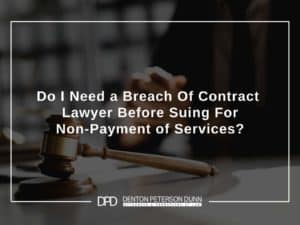
As a small business owner, you may have a customer who is refusing to pay a past due invoice. If you’ve sent multiple invoices, followed up several times by phone and email, and escalated the problem as much as possible on your own, but the client is still ignoring you, you have the option to sue the customer for non-payment of services. This process involves making a formal demand for payment, filing a lawsuit, and going to court.
Suing for non-payment can be time consuming and expensive, so you’ll want to assess the amount that is past due and determine whether pursuing legal action in court is a worthwhile expenditure. Consulting with your Chandler business attorney can help you understand the process for a more successful outcome.
In order to successfully sue a customer or client for non-payment, you’ll need to consider how much money you are owed and then follow specific steps.
Before you take any legal action, send a final invoice to the client. Include a formal letter approved by your Avondale business attorney that clearly states the following:
In many cases, the threat of legal action is all it takes to force clients to make a full payment. But if they still refuse to cooperate, this letter will provide crucial evidence in court that you made a final attempt to collect before suing.
If you don’t receive payment after sending a final invoice, take time to evaluate whether it’s worth the time and expense to sue the client for non-payment. Lawsuit costs can be high, and you’ll also have to take your own time, or pay for an employee’s time, to work with your Gilbert franchise attorney and pursue litigation. Your business will need to decide if the value of the invoice is worth the effort. Consider the total amount that you are owed, and examine the financial state of the debtor to make sure it is able to pay you back. If the debtor may file for bankruptcy or doesn’t seem to have the assets to make the payment, it may be better to sell the debt to a collections agency instead of suing.
Your Glendale business attorney is an excellent resource to help you decide whether it’s worthwhile to initiate a lawsuit for non-payment. Your lawyer can advise on your case, discuss the strength of your case, and provide other legal guidance or insights on the situation. Although you can technically sue a client for non-payment without an attorney, having legal guidance improves your chances of building a strong case, avoiding pitfalls and winning the lawsuit so you can recoup what you are owed.
If you and your Goodyear business lawyer decide that moving forward with a lawsuit is the best option, you’ll need to decide in which court to file. The least expensive and fastest option is small claims court, but this is only an option if you are owed a relatively small amount of money (usually less than $2,500 in Arizona). Most people don’t need to hire a lawyer for representation in small claims court. Your case will be heard and decided quickly; if your client doesn’t show up, you’ll win by default.
If your case is more complex or worth a higher amount than small claims court can handle, consider filing a civil lawsuit. These are more formal, time consuming, and extensive cases that typically require legal representation. You’ll need to pay for your attorney’s fees, court fees, and either your own time or an employee’s. However, it may be worthwhile if you are owed a lot of money.
Because you are initiating the lawsuit, you’ll need to pay the filing fees for your lawsuit. However, if the judge rules in your favor and requires the customer to pay the invoice, they will usually also rule that the client must pay for your court fees (and usually your reasonable attorneys’ fees) in addition to the past due bill.
If your small business is seeking guidance regarding a non-paying client, contact the experienced attorneys at Denton Peterson Dunn. We have successfully helped hundreds of small businesses with contracts, legal documents, franchise law, breach of contract, non-payment, and other business disputes. Let us give you large firm results with the personalized touch that only a small firm can provide. Contact our office today to schedule your consultation.
Brad Denton – Denton Peterson Dunn
1930 N Arboleda #200
Mesa, AZ 85213
Office: 480-660-3249
Email: brad@dentonpeterson.com
Website: https://arizonabusinesslawyeraz.com
7272 E Indian School Rd #540-132
Scottsdale, AZ 85251
Phone: 480-690-3283
Email: service@dentonpeterson.com
Are you dealing with labor law violations regarding trade secrets? Consult with employment law experts…
Wondering how to protect trade secrets in litigation? Learn strategies for early identification, specificity, and…
Want to protect your business from liability and disputes? Learn effective contractual tools and legal…
Concerned about embezzlement in your business? Learn how to safeguard against theft, understand legal distinctions,…
How is remote work reshaping commercial real estate? Explore how businesses are adapting leasing strategies,…
Is your business ready for remote work? Learn the legal considerations & best practices for…